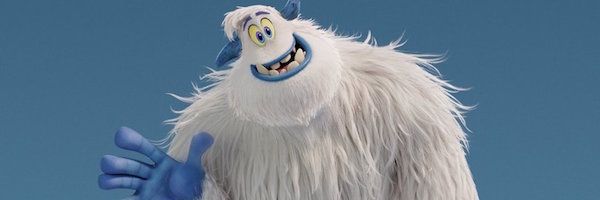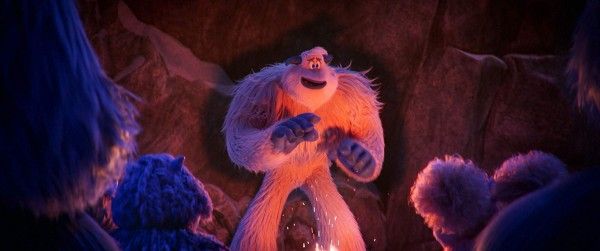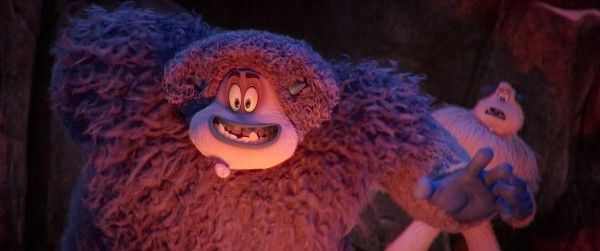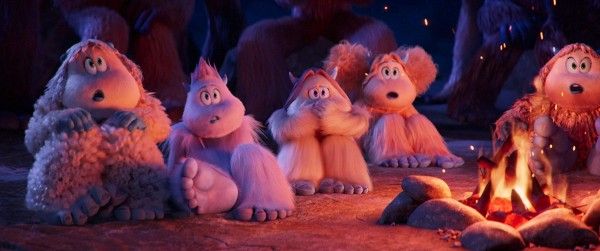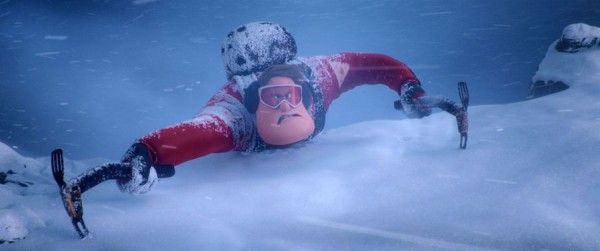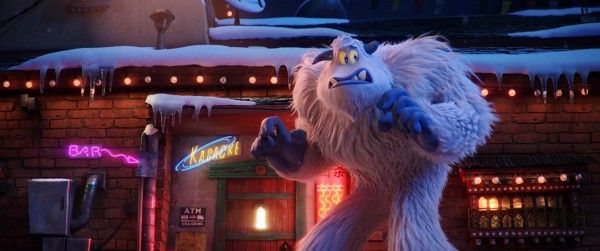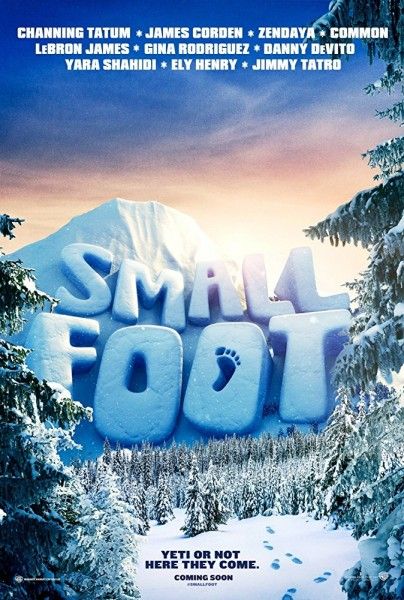A manipulative leader that openly lies to his people; a public willing to accept anything as ‘truth,’ just so long as it substantiates their beliefs; and a ‘wall’ constructed to keep out the unwanted, so-called ‘beasts.’ All these hot-button and thorny issues are tackled (rather complexly, too) in, well… a Warner Brothers animated film about talking Yetis.
Yes, Smallfoot, underneath its poppy musical numbers and colorful animation, is a surprisingly profound allegory for our current times, digging into xenophobia, dogmatism & truthiness without ever sacrificing its breezy ‘Looney Tunes’ aesthetic. Simply put—the film works both as a fun children’s comic-adventure and as something much more (that is-- if you’re looking.)
In the animated feature, all Yeti’s live isolated atop a mountain-top, surrounded by only the clouds below. They are told by their benevolent leader, Stonekeeper (Common), that beneath these clouds-- the world ceases to be, and that, of course, there is no such thing as a human being (aka a ‘Smallfoot.’) Migo (Channing Tatum) lives a simple life within this community, only wanting to follow in his father’s footsteps and win the affections of the comely Meechee (Zendaya); but after a chance encounter with an actual human, Migo begins to question the Stonekeeper’s ‘truth’ and wonders if perhaps something else lurks beneath the cloudy barrier.
In the following interview with director Karey Kirkpatrick, he discusses how Smallfoot reflects today’s current events, the film’s initial animatics, and navigating the film’s completion amidst a leadership shake-up at Warner Bros. (Of note: Some mild spoilers follow; as well as a brief Channing Tatum cameo towards the end of the interview.)
Collider: I really like the squeaky sound humans have to the Yeti’s ear. How do you calibrate the perfect pitch of highness for the human’s voice(s)?
Karey Kirkpatrick: That was our editor Peter Ettinger. That's actually him doing Percy's [James Corden] voice… He just read random words and played around with the pitches. He came up with a formula and did it as a temp. It made everyone laugh the minute we heard it. So we were like, ‘Leave it alone, don't mess with it.’
It's gonna turn into like a ‘Minion’ type thing, where people try to figure out the exact language behind the gibberish.
Kirkpatrick: Yeah, I know. Actually, my favorite line of the movie is when [Percy] says ‘Get-to-da-be-la-boo.’
Going back to the beginning, I know this film has been in development for a while. How much of the script was in place when you came aboard? [Kirkpatrick replaced the original director well into development on Smallfoot.]
Karey Kirkpatrick: The way animation works is that there's a script, and then there's an animatic (a preliminary version of the film via storyboard.) So I got sent an animatic to watch. [Producer] Bonne Radford and I had done three movies together-- so it was literally watch this. We feel like it's gone in a direction… Often over time, [these films] lose their way. But that's the beauty of the medium-- you get to watch it. You're not just working in screenplay form.
What was that initial animatic?
Kirkpatrick: It was very different. Same premise obviously, but a very different kind of movie. At the time, John [Requa] and Glenn [Ficarra], [who wrote an earlier version of the script,] had an idea that in terms of the misunderstanding… Percy was sort of a ‘dude,’ like a ski bum type. He had no backstory-- he just came out and saw a Yeti and was on a phone going, ‘Bro, bro, bro, bro...’ And all the Yeti could understand was the word 'bro.' That was his only word throughout the whole piece, which was a very fun idea for... one scene. So that was one of the first things I did when I came on. We needed to give this guy an actual [story]-- so he has an arc and more depth.
Meechee was also a very different character. She was just the Stonekeeper's daughter. She wasn't in the SES (Smallfoot Evidentiary Society). She wasn't their secret leader. To be honest, all the women who were working on the movie were like, ‘These women characters are just not there.’ So we made Meechee the secret leader of the SES and gave her more intelligence and curiosity. Those were the things we ended up changing; but the structure was always pretty similar-- starting in the Himalayas, Yeti and human meet...
How many drafts do you go through before you do another round of storyboards and animatic?
Kirkpatrick: By the time I came on, the movie had a release date... So I came in about July of 2016, so I had two years and two months.
That's not a lot of time for an animated feature…
Kirkpatrick: Yeah, it isn't. But the other thing that happened-- Four months after I came aboard, the studio underwent a complete leadership change as studios often do. The old chairman of the studio was out; Toby Emmerich was in. Then, they do an inventory of what movies they have-- so here's [Smallfoot]: it's an animated movie, and we've already got a lot of money sunk into it-- so it's coming out. To backtrack now would be to write down a big [loss] because we already had character designs and test animation done. There was a lot of money put into this movie, so it became sort of like… figure this out. But you still have to get the new regime up to speed, which means a lot of screenings, not necessarily scripts. So what you end up doing is-- You're trying to fix things, while at the same time preparing [new] screenings. So it's a lot like the train's behind you, and you're putting track down in front of it, iteration by iteration. I can tell you this-- it is to Toby's and Warner Brothers' credit that they can watch [an early version] and [give it] the okay-- because it did not look very good two years ago.
Is it easier to work that way-- as you don't have many people questioning your decisions with this looming release date?
Kirkpatrick: It's not easier… But I'm a firm believer in the eleventh hour. It's a natural part of the process to kick the can down the road. This is tomorrow's problem. At a certain point though, I got down to the end of the road, and there were a lot of cans that I had to deal with. But what you end up doing is you find chunks of the movie where the tone feels right, or this scene feels right. We do these things in sequences, and you watch the movie and go, ‘This sequence hasn't changed in the last three screenings, so I guess it's safe.’
Actually, the first thing we animated in this movie was-- when they're lowering Migo [beneath the clouds] on the rope... And interestingly, when we animated that sequence, Meechee was not in the scene. Because we hadn't come up with that plot point yet, so we had to go back in...
[At this point Channing Tatum (Migo) drops by to say hello to Karey; then, he, too, joins the discussion.]
Kirkpatrick (to Tatum): The first time you saw the movie, Meechee wasn't in that scene, right?
Channing Tatum: No, the very first time I came in and read as much of the script as I can remember, Meechee didn't even go down below the clouds.
Kirkpatrick: Yeah, they all came back up.
Tatum: Exactly. And then later, I was like hold on-- now Meechee goes down there, too?
Kirkpatrick: …To your credit, you always roll with [the new material.]
Tatum: That's what so beautiful about your process. You see what it is, and then go, ‘Alright, this is what we need to do,’ and then you just charge at it.
[Tatum gets whisked away by his publicist for another interview.]
There are so many interesting themes in the film-- xenophobia, dogmatism, certain current events… Do you feel like the compressed schedule allowed you to sneak this topical stuff through?
Kirkpatrick: What happened was the world changed when we were making the movie. As we're sitting there trying to figure out what [the movie’s] really about, there was an election, there was Brexit, there were migrants… Then, suddenly the things that were already inherent in our movie-- the Yeti mountain and the clouds as one big ‘border wall,’ and they’re isolationists up there, while ‘the other’ is something to be feared… Suddenly, that was in the news-- the truth was fast and loose, reporters weren’t allowed to ask questions… We were like, ‘Hey, we don't need to look much further than CNN or BBC News to figure out what this movie is really about, and why it's relevant today.’
Smallfoot is now in theaters.

